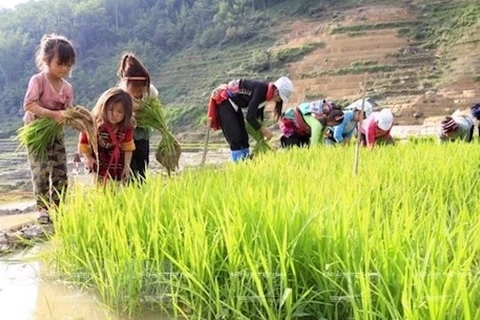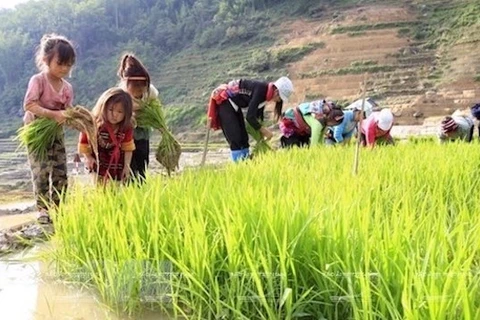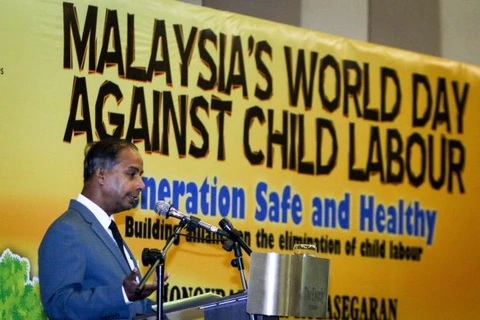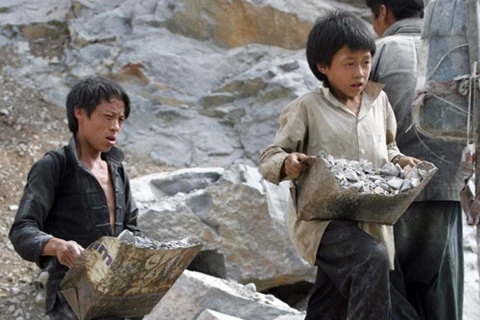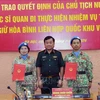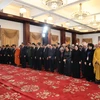Hanoi (VNA) – The Ministry of Labour, Invalids and Social Affairs (MoLISA) in collaboration with the International Labour Organisation (ILO) held a policy dialogue on March 13 on international standards related to child labour amidst international trade commitments.
The event served as a chance for delegates to share Vietnamese and international experiences, and give recommendations and proposals for the prevention of child labour.
According to a survey by the MoLISA’s Institute of Labour, Science, and Social Affairs across three cities and provinces, more than 7 percent of households have members aged from 5 to 17 engaging in economic activities. Nearly 2 percent of households have a member in this age group involving in heavy, toxic, and dangerous jobs.
Dang Hoa Nam, Director of the Department of Children, said that child labour has been particularly rampant in the unofficial sector, with employers often taking advantage of children for their low wages. The employment of child labour in supply chains is also a risk, he said.
According to Nam, the objectives of the project in reducing and putting an end to child labour during the 2016-2020 period include raising public awareness of associated laws at all levels, sectors, and organisations related to labour and community.
Currently, the awareness of child labour laws in Vietnam is not adequate as legal regulations in the field have yet to be strictly implemented, he said.
Meanwhile, ILO Vietnam Director Chang-Hee Lee said that Vietnam has approved the convention on child labour and taken steps towards improving the situation. However, he noted that a large number of children are working in household businesses and the unofficial sector.
At the same time, the definition of children working in supply chains is rather new in Vietnam, added Lee.
He said that the ILO has mobilised relevant agencies to conduct a model of cooperation on the prevention and ending of forced labour, human trafficking, and modern forms of slavery.
Participants at the dialogue said that in the context of international integration and Vietnam’s engagement in free trade agreements, the realisation of international commitments on labour in supply chains will receive greater attention, especially issues related to child labour.
The prevention and ending of child labour should start from raising the awareness of children, their parents, the community, and businesses, they said.
The delegates also stressed the need for the regular, continuous, and stable engagement of and close coordination among social sectors, state agencies, businesses, trade unions, families, and the community.–VNA
The event served as a chance for delegates to share Vietnamese and international experiences, and give recommendations and proposals for the prevention of child labour.
According to a survey by the MoLISA’s Institute of Labour, Science, and Social Affairs across three cities and provinces, more than 7 percent of households have members aged from 5 to 17 engaging in economic activities. Nearly 2 percent of households have a member in this age group involving in heavy, toxic, and dangerous jobs.
Dang Hoa Nam, Director of the Department of Children, said that child labour has been particularly rampant in the unofficial sector, with employers often taking advantage of children for their low wages. The employment of child labour in supply chains is also a risk, he said.
According to Nam, the objectives of the project in reducing and putting an end to child labour during the 2016-2020 period include raising public awareness of associated laws at all levels, sectors, and organisations related to labour and community.
Currently, the awareness of child labour laws in Vietnam is not adequate as legal regulations in the field have yet to be strictly implemented, he said.
Meanwhile, ILO Vietnam Director Chang-Hee Lee said that Vietnam has approved the convention on child labour and taken steps towards improving the situation. However, he noted that a large number of children are working in household businesses and the unofficial sector.
At the same time, the definition of children working in supply chains is rather new in Vietnam, added Lee.
He said that the ILO has mobilised relevant agencies to conduct a model of cooperation on the prevention and ending of forced labour, human trafficking, and modern forms of slavery.
Participants at the dialogue said that in the context of international integration and Vietnam’s engagement in free trade agreements, the realisation of international commitments on labour in supply chains will receive greater attention, especially issues related to child labour.
The prevention and ending of child labour should start from raising the awareness of children, their parents, the community, and businesses, they said.
The delegates also stressed the need for the regular, continuous, and stable engagement of and close coordination among social sectors, state agencies, businesses, trade unions, families, and the community.–VNA
VNA

